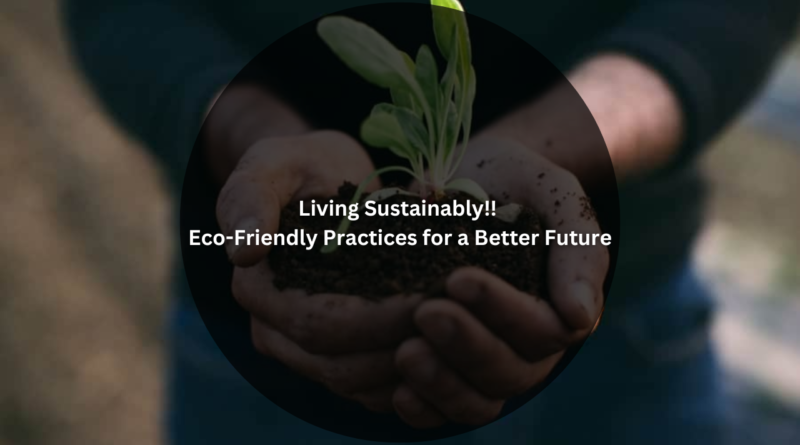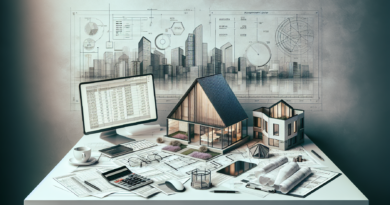Living Sustainably: Eco-Friendly Practices for a Better Future
Imagine that every action, whether it’s big and small, is guided by sustainability. In this world, people, communities, and businesses are all dedicated to saving our planet for future generations instead of living in the moment and letting whatever comes tomorrow roll in.
Such a scenario is no longer a fantasy; it’s a necessity. So, how do we step up and integrate sustainable practices into our lives?
Key Elements of Sustainable Living
Sustainability isn’t a complex enigma — it’s all about simple daily habits that can help our planet when we all do them.
Here, each step counts, and every little bit helps. Let’s discuss simple steps to lead a sustainable life, even if you’re holed up on the hundredth floor in a bustling urban jungle:
- Minimise the waste: Always go for less-packaged goods – say no to potatoes individually wrapped in plastic – and get reusable bags, water bottles, and coffee cups instead of to-go coffees.
- Conserving water: You can save water without feeling restricted. Fix leaky faucets, turn off the tap when brushing your teeth, and switch to water-efficient showerheads — they are stylish, modern, and environmentally friendly.
- Going renewable: Get solar panels for your rooftop, switch on to a power provider that’s all about renewable energy, and swap out your old gadgets for sleek, energy-efficient models that are Energy Star-certified – it is a dynamic initiative spearheaded by the U.S. Environmental Protection Agency and U.S. Department of Energy that promotes energy efficiency.
- Recycling and composting: Sort your trash and recycle often. Also, you can turn food leftovers like vegetable peels and fruit rinds into compost to make nutrient-rich soil for your garden if you have one.
- Using public transport or carpooling: Choose public transit, carpool with friends, or pedal your way on a bike and save the planet one trip at a time.
- Shopping smart, saving the planet: Choose fair-trade and eco-friendly goods, buy in bulk to cut back on packaging, and start thrifting — if you still haven’t — to give a second life to used items.
- Reducing energy usage: Turn off unneeded lights when you leave the room, don’t forget to turn off appliances you are not using, and invest in gadgets like energy-efficient light bulbs, smart power strips, and programmable thermostats.
Role of Law in Sustainable Practices
From local communities to the global stage, environmental laws and regulations work daily to make our planet last longer.
They shape how businesses operate, and communities flourish. In the U.S., these laws serve to protect our environment.
Here are some key pieces of legislation you must know — and use if someone dares to break them:
- The Clean Air Act is a federal law that sets the bar for air quality and controls air pollutants to make our skies clearer and our lungs healthier.
- The Clean Water Act guards U.S. waters against harmful pollutants and sets safety standards for bodies of water to protect endangered species and people.
- The Endangered Species Act protects species in danger of disappearing and their places.
- Resource Conservation and Recovery Act (RCRA) gives the Environmental Protection Agency (EPA) the authority to control hazardous waste from the “cradle to grave.” This includes generating, transporting, treating, storing, and disposing of hazardous waste.
- National Environmental Policy Act (NEPA) requires a report on the environmental effects of federal actions that significantly impact the environment.
Legal Documents and Sustainability
Did you know that legal documents can help in promoting sustainability? They can help people create contracts that are meant to increase the level of sustainability of our actions. Here are a few examples of legal documents you may need:
- Shared Resource Agreements: These documents help people share tools or vehicles. For example, a neighborhood might use a Shared Resource Agreement to manage the use of a shared lawnmower or a community vehicle.
- Green Lease Agreements: Renting your property to tenants? You can include clauses promoting environmentally friendly habits like recycling, energy conservation, and minimizing waste.
- Sustainable Business Practices Contracts: These contracts can detail your commitments to renewable energy use, sustainable waste management, and emissions reduction strategies. For instance, such a contract may show that a business pledges to run its operations entirely on renewable energy, launches an all-encompassing recycling and composting initiative, and aims to reduce its carbon emissions by 50% over the next decade.
- Estate Planning Documents: You can leave a positive impact on the environment in your will or trust. For example, you might specify a portion of your estate to be donated to an organization dedicated to forest conservation, or you could request that instead of traditional burial methods, your body be laid to rest using a green burial method, which has less impact on the environment.
- Community Garden Agreements: If you want to start a community garden, a legal document that lists rules and duties can help ensure it runs and stays in good shape for a long time. For instance, an agreement may stipulate that each member is responsible for their own plot, including regular watering and weeding. It might also prohibit chemical pesticides and require that all plants and seeds used are non-GMO.
Legal templates like the ones available here make things even easier. These templates help create agreements that support a more sustainable lifestyle.
Working with such templates, you can immediately get a document formed by lawyers dealing with your state’s ecology and sustainability issues.
Conclusion
Every step towards sustainability counts. Even the smallest green choices can have a big impact on our planet. Take cycling or walking instead of driving for short distances — it’s not only healthier, it’s a simple way to cut carbon emissions.
No matter how minor, every eco-friendly choice may contribute towards a greener and healthier earth. And this is the heritage that we will leave to future generations.
Also Read:




